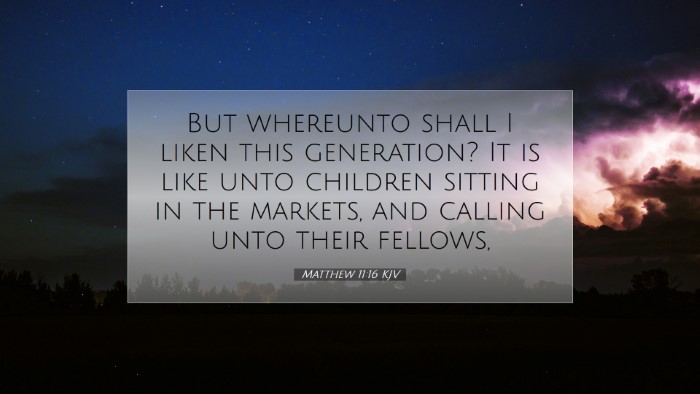Commentary on Matthew 11:16
Matthew 11:16 states: "But whereunto shall I liken this generation? It is likeunto children sitting in the markets, and calling unto their fellows." This verse is a poignant observation of the societal condition during Jesus’ earthly ministry, raising profound implications about human nature and spiritual receptivity.
Contextual Understanding
This verse is situated within a passage where Jesus addresses the unbelief of the towns that witnessed His miracles (Matthew 11:20-24) and simultaneously reflects on the differing responses elicited from society. It analogizes the generation of His time to children in a marketplace, indicating a lack of maturity and discernment.
Matthew Henry's Insights
According to Matthew Henry, this metaphorical comparison to children signifies:
- Immaturity: Just like children who do not comprehend the deeper implications of their play, the generation of Jesus is caught up in trivialities, unable to grasp the weighty matters of faith.
- Restlessness and Discontent: Children in the marketplace symbolize a generation that is never satisfied, perpetually calling for more and desiring to be entertained rather than engaged in serious reflection on spiritual truths.
- Division of Thought: The variance in response—some dancing and others mourning—illustrates the division within society. This reflects how the message of the Kingdom of God has met with diverse receptions, from outright rejection to indifferent amusement.
Albert Barnes' Interpretation
Albert Barnes expands on the idea of children in the marketplace by suggesting:
- Call to Action: The children’s cries for play signify a summons for action; however, society fails to respond to the weighty call of repentance that Jesus proclaims.
- Peer Influence: The "fellows" being called upon represents not only the influence of peers in trivial matters but serves to highlight the collective ignorance and distraction of the society in which spiritual matters are often neglected.
- Comparison to John the Baptist and Christ: This text serves as a contrast to the lifestyle of John the Baptist and of Jesus Himself, where the former’s abstinence from pleasure was ridiculed while the latter’s joy was interpreted as gluttony. Here, both extremes illustrate the fickleness of human judgment.
Adam Clarke's Commentary
Adam Clarke brings further dimension by analyzing the cultural significance of marketplaces in the ancient Jewish context:
- Sociocultural Engagement: Marketplaces were venues for social interaction. Thus, when Jesus likens His generation to children there, he comments on their superficial participation in matters of faith, choosing trivial pursuits over significant spiritual engagement.
- Moral Indictment: Clarke suggests that Jesus’ words serve as a moral indictment upon those who show zero commitment while still expressing dissatisfaction with the prophetic voices sent to them.
- Futility of Complaints: Just as children in the marketplace complain about the lack of specific games, this generation complains about the message delivered without acknowledging its divine purpose and authority.
Theological Implications
The deeper theological implications of Matthew 11:16 pertain to the nature of God's call and humanity's response:
- Human Disobedience: This scripture underscores a universal truth: humanity often resists clear divine direction, preferring instead to remain in a state of spiritual infancy.
- God's Patience: This passage also delineates God's long-suffering in dealing with those who neglect His words. Despite the failure to recognize His presence, His compassion continues to reach out through His Son.
- Importance of Spiritual Discernment: For the church today, the challenge remains to cultivate spiritual discernment, understanding that the trivial pursuits of society can distract from the authentic call of Christ.
Application for Pastors and Theologians
For pastors, students, and theologians, Matthew 11:16 holds numerous applicable lessons:
- Assessing Discipleship: It invites reflection on the state of discipleship today; are we training believers to engage deeply with Scripture?
- Evangelistic Approach: It urges the church to consider how effectively we engage with a generation that may be spiritually apathetic.
- Calling to Action: Finally, it is a call to action for all Christians to avoid complacency and to actively pursue a deeper relationship with God, rather than remaining satisfied with surface-level engagement.
Conclusion
In summary, through Matthew 11:16, Jesus articulates a profound critique of His generation's failure to understand and respond to the divine invitation. The metaphor of children in the marketplace serves as a timeless reminder of the perils of spiritual immaturity and the importance of discerning God's voice amidst societal distraction. For contemporary believers, this passage serves as a catalyst for introspection and a renewed commitment to faithful discipleship.


